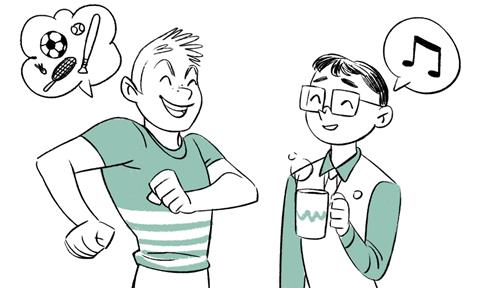Once you’re able to introduce yourself, you’ll need to learn how to express your feelings and emotions to other people in order to communicate freely. Because after all, expression is the heart of any language. In this chapter we’ll go over how to express a few emotions related to likes and dislikes.
As this is a shorter chapter, take your time to make sure that you feel comfortable with each expression and grammar form before moving on.
Conversation

A: 저는 스포츠를 좋아합니다.
B: 저는 음악을 좋아합니다. 스포츠를 싫어합니다.
This lesson brings us a short conversation, but it should be enough for what we need to cover. Let’s go over each part.
A: 저는 스포츠를 좋아합니다.
"I like sports."
You’ll notice right away that "I like" comes after "sports." This is a bit backwards from the way we do things in English. I’ll explain how this works in the next chapter, but for now simply remember that what you like comes before the word "like."
What is that 을 or 를?
This is called an Object Marker. Its purpose is to point out, "hey, there’s an object right before me!"
"What is an object?" Let’s look at the sentence "I eat food." Here, the verb is "eat," and the object of that verb is "food." An object is what receives the action of a verb.
An Object Marker is placed directly after the object, and never before. Use 를 when it comes after a vowel, and use 을 when it comes after a consonant.
Vowel: 스포츠를
Consonant: 음악을
B: 저는 음악을 좋아합니다. 스포츠를 싫어합니다.
"I like music. I dislike sports."
Here, the sentence works the same as above. We put "music" before "like" because that’s how Korean does things.
Pronouns
You may have noticed that although we translated the second sentence as "I like sports," there is no word for "I" in the sentence anywhere. Korean is a bit unique, in that as long as the pronoun can be easily guessed from the sentence, you don’t need to include it. Pronouns in Korean are only used when necessary.
In addition, once it’s already clear who you are talking about, there is no need to repeat 저는 every sentence.
저는 수영을 좋아합니다. 축구를 싫어합니다.
"I like swimming. I dislike football."
In this sentence it is not necessary to use 저는 in the second sentence, because it is already clear who you are talking about.
댄스를 싫어합니다.
"I dislike dance."
Here, unless it would be vague who dislikes dance, it’s not necessary to include 저는 at the beginning.
저는 수영을 좋아합니다.
"I like swimming."
For this sentence, perhaps someone else was talking about his or her opinions before, and now you want to add your thoughts.
Culture Notes:

Most Korean names are 3 syllables; one syllable for the family name, or last name, and two syllables for the first name. For example, in the name 김철수, 김 is the last name and 철수 is the first name.
Practice
Practice making your own sentences using a noun, the Object Marker, and one of each of our phrases in the spaces below. Choose the correct Object Marker for each sentence.
1. 저는 __________을/를 좋아합니다.
2. 저는 __________을/를 사랑합니다.
3. 저는 __________을/를 싫어합니다.
Translate to English:
4. 안녕하세요. 저는 철수입니다. 음악을 좋아합니다. 댄스를 싫어합니다.
Translate to Korean:
5. I love sports. I like American football. I dislike swimming.
New Phrases
좋아합니다. - "I like."
사랑합니다. - "I love."
싫어합니다. - "I dislike."
New Vocabulary
을/를 - Object Marker
스포츠 - "sports"
야구 - "baseball"
축구 - "football"
미식축구 - "American football"
농구 - "basketball"
배구 - "volleyball"
테니스 - "tennis"
탁구 - "table tennis," "ping-pong"
피구 - "dodge ball"
하키 - "hockey"
수영 - "swimming"
골프 - "golf"
등산 - "mountain climbing," "hiking"
음악 - "music"
시 - "poetry"
댄스 - "dance"
역사 - "history"
음식 - "food"